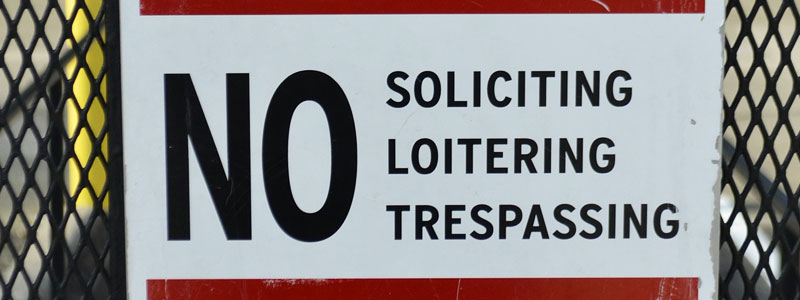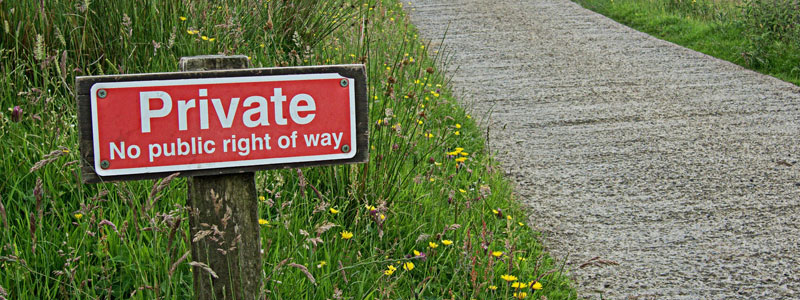Are Property Owners Responsible for the Behavior of Loiterers?
Businesses and homeowners are hardly ever expected to ensure the safety of trespassers, but they must make sure the people they invite onto their property are well-protected and well-informed of any dangers on the property. However, this doesn’t mean property owners can just ignore the people who trespass or loiter, since those people’s actions can […]

June 11, 2018

Businesses and homeowners are hardly ever expected to ensure the safety of trespassers, but they must make sure the people they invite onto their property are well-protected and well-informed of any dangers on the property.
However, this doesn’t mean property owners can just ignore the people who trespass or loiter, since those people’s actions can cause harm to the people who are supposed to be there. As is the case with many legal battles, the facts of each individual case can change the outcome dramatically, but a few general concepts can help victims determine if their injury may fall under premises liability.
Foreseeing Dangers

Store and homeowners aren’t outright required to protect their invitees (people who have the right to be on the property: shoppers, friends, etc.) from every possible danger. This would be too difficult for every business and private landowner to accomplish, so the law only holds property owners liable for hazards they know about or should know about on their property.
Trespassers’ Limited Rights
This awareness of potential hazards (known as the duty of care) extends to the people who enter the premises uninvited, but only in certain situations. In cases of repeated, non-malicious trespassing, property owners can be held liable for injuries resulting from an owner’s overbearing attempt to prevent trespassing. For example, if you know neighborhood kids cut through your backyard on a regular basis, you can’t put bear traps in their path to get them to stop. You would probably be liable for their medical bills under a premises liability claim.
Invitee’s Rights
However, property owners maintain the right to protect their invitees from known or obvious dangers, such as repeated violent crimes in the parking lot, or a crowd of loiterers that accost passersby in front of the building.
Since both these situations can potentially lead to escalating conflict and injury, property owners have the responsibility to prevent them. If they choose to ignore circumstances like these, allowing loiterers and trespassers to harass invitees, victims may be able to prove the property owners are liable for their injuries.
Red Flags for Owners’ Negligence

Though not always a guarantee that a place of business is liable for negligence, these red flags may indicate that owners either aren’t aware or don’t care about the safety measures they should have in place to protect their invitees.
The point of these safety measures is not to eliminate the threat of harm completely, but to let bystanders know the owners will do whatever is reasonably necessary to protect their visitors. When businesses fail to do any or all of these things, the accidents or injuries that ensue may cause them to be found liable in a premises liability case.
No Loitering Signs
Though hardly an effective enforcement policy on their own, signs that designate areas around a building as “no loitering” means the employees and owners have the right and easy defense for confronting individuals who congregate around the property.
Confronting Trespassers
Some store employees go above and beyond their job description to help keep their premises safe, but they’re not the only line of defense. If the situation is likely to escalate to violence, staff members can call the police. They may be held liable for ignoring or failing to reasonably respond to dangerous situations if they do not do so.
Bystanders Taking Charge
Civilians and non-property owners can help mitigate situations that seem dangerous. First and foremost, speak up! Tell staff so they can correct any glaring issues, or so you can testify that they ignored your warning. You can also choose to stop patronizing that store; your business should matter to the owners and if they want it back, tell them to solve the problems that may cause harm to their invitees.
Get Help Filing a Premises Liability Claim
Some injuries and crimes are simply an unfortunate result of being in the wrong place at the wrong time. However, if you or someone you know has been hurt at a place of business by a third party, the business could be liable for failing to protect those it invites onto its property.
With all the Indiana laws, court precedents, and tricky legal language, it’s hard to know for sure whether your situation falls under a premises liability claim. That’s why Hensley Legal Group offers victims a free consultation before every case. Call us or contact us online today to find out if you may benefit from filing a premises liability claim.